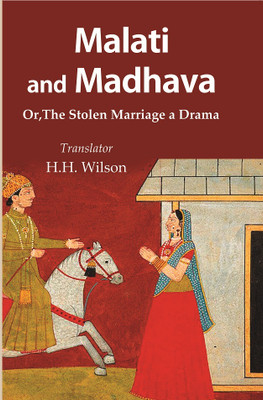Malati and Madhava : Or, The Stolen Marriage a Drama(Paperback, Translator : H.H. Wilson)
Quick Overview
Product Price Comparison
About The Book : Malati and Madhava; or, the loves of the Youth Madhava and the maiden Malati has been already introduced to the knowledge of European readers, as an outline of the plot and a translation of part of the fifth Act were published by Mr. Colebrook in his Essay on Sanskrit and Prakrit Prosody. The specimens then given were calculated to convey a favourable impression of the merits of the drama, which the perusal of the entire piece will probably confirm. The story of "Malati and Madhava" is one of pure invention, and the piece belongs to the class of compositions termed Prakarana. It is referred to as an example of the class by all the works on Rhetoric, the oldest of which it consequently precedes. The history of the drama, however, or more correctly of its author, is attended with more certainty than most of the topics of the literary history of the Hindus. By the introductions to "Malati and Madhava," and the other dramas of the same writer, the "Uttara- Rama-Charitra" and the "Vira-Charitra," we are made fully acquainted with his origin and family. It appears from these accounts that Bhavabhuti, also named Srikantha, or he in whose throat eloquence resides, was the son of a native of the South of India, a Brahman of Berar or Beder, and a member of the tribe of Brahmans who pretend to trace these descent from the sage Kasyapa, of whom it is said that some are still to be found in the vicinity of Condavir. The site of Bhavabhuti's birth-place is fully corroborated by the peculiar talent he displays in describing nature in her magnificience, a talent very unusual in Hindu bards, who delight to portray her minuter beauties, and one which he no doubt derived from his early familiarity with the eternal mountains and forests of Gondwana. About The Translator : H.H. Wilson (26 September 1786-8 May 1860) was an English orientalist who was elected the first Boden Professor of Sanskrit at Oxford University. He studied medicine at St Thomas's Hospital, and went out to India in 1808 as assistant-surgeon on the Bengal establishment of the British East India Company. His knowledge of metallurgy caused him to be attached to the mint at Calcutta, where he was for a time associated with John Leyden. In 1832 Oxford University selected Dr. Wilson to be the first occupant of the newly founded Boden chair of Sanskrit : he had placed a column length advertisement in The Times on 6 March 1832 p. 3, giving a list of his achievements and intended activities, along with testimonials, including one from a rival candidate, as to his suitability for the post. In 1836 he was appointed librarian to the East India Company. He also taught at the East India Company College. On 10 April 1834 he was elected as a Fellow of the Royal Society of London.Wilson became deeply interested in the ancient language and literature of India, and was the first person to translate the Rigveda into English. In 1813 he published the Sanskrit text with a free translation in English rhymed verse of Kalidasa's lyrical poem, the Meghaduta, or Cloud-Messenger.


